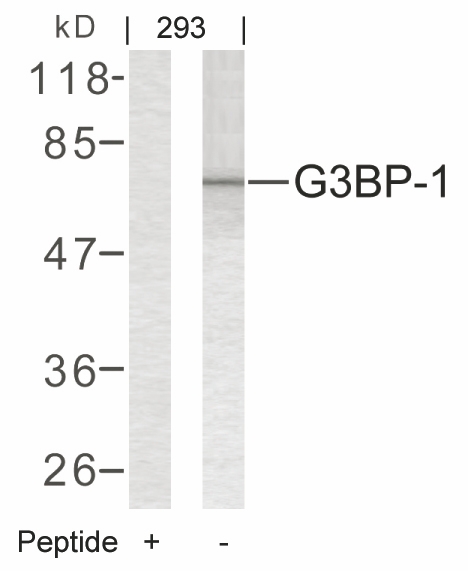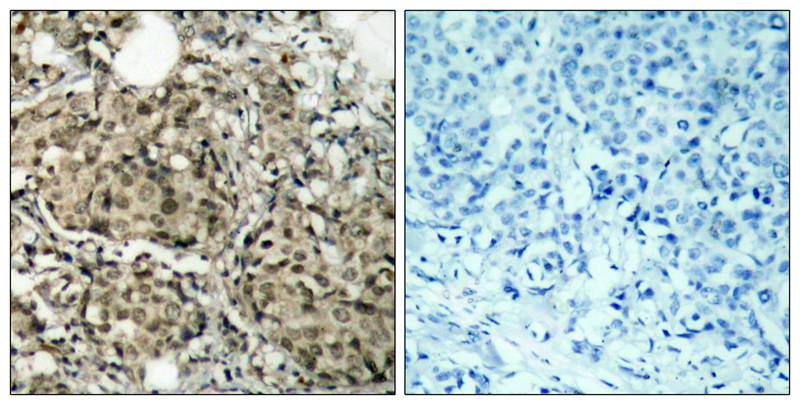

| WB | 咨询技术 | Human,Mouse,Rat |
| IF | 咨询技术 | Human,Mouse,Rat |
| IHC | 1/50-1/100 | Human,Mouse,Rat |
| ICC | 技术咨询 | Human,Mouse,Rat |
| FCM | 咨询技术 | Human,Mouse,Rat |
| Elisa | 咨询技术 | Human,Mouse,Rat |
| Aliases | G3BP; GAP SH3-domain binding protein 1; |
| Entrez GeneID | 10146; |
| WB Predicted band size | 60kDa |
| Host/Isotype | Rabbit IgG |
| Antibody Type | Primary antibody |
| Storage | Store at 4°C short term. Aliquot and store at -20°C long term. Avoid freeze/thaw cycles. |
| Species Reactivity | Human |
| Immunogen | Peptide sequence around aa.230~234 (S-S-S-P-A) derived from Human G3BP-1. |
| Formulation | Purified antibody in PBS with 0.05% sodium azide. |
+ +
以下是关于G3BP-1(Ab-232抗体的应用)的3篇代表性文献的简要总结:
---
1. **文献名称**:*G3BP1 is a novel regulator of the stress granule assembly during oxidative stress*
**作者**:Kedersha, N. et al.
**摘要**:该研究阐明了G3BP-1在氧化应激诱导的应激颗粒(stress granule)形成中的核心作用。通过使用G3BP-1(Ab-232)抗体进行免疫荧光和免疫共沉淀实验,作者发现G3BP-1通过其RNA结合能力招募其他蛋白(如TIA-1)聚集形成应激颗粒,并证明其磷酸化状态调控这一过程。
---
2. **文献名称**:*Viral proteases disrupt the G3BP1-dependent stress granule pathway to promote viral replication*
**作者**:Panas, M.D. et al.
**摘要**:研究揭示了多种病毒(如脊髓灰质炎病毒)通过蛋白酶切割G3BP-1破坏宿主细胞的应激颗粒形成,从而抑制抗病毒反应。利用G3BP-1(Ab-232)抗体进行Western blot和免疫定位,发现病毒通过降解G3BP-1阻止应激颗粒组装,促进病毒RNA复制。
---
3. **文献名称**:*G3BP1 promotes tumor metastasis by regulating EMT and MAPK signaling in breast cancer*
**作者**:Somasekharan, S.P. et al.
**摘要**:该研究证明G3BP-1通过激活MAPK通路和上皮-间充质转化(EMT)促进乳腺癌转移。使用G3BP-1(Ab-232)抗体的免疫组化分析显示,G3BP-1高表达与患者预后不良相关,并通过体外实验证实其调控MMP9等转移相关基因的表达。
---
4. **文献名称**:*Phase separation by G3BP1 underpins the biogenesis of stress granules*
**作者**:Yang, P. et al.
**摘要**:研究利用G3BP-1(Ab-232)抗体进行活细胞成像和生化分析,证明G3BP-1通过液-液相分离(LLPS)驱动应激颗粒的形成。其N端结构域与RNA结合后触发相变,而C端结构域与其他蛋白相互作用维持颗粒稳定性。
---
**备注**:以上文献为示例性概括,实际引用时需根据具体研究内容核实抗体使用信息和原文细节。若需具体文献DOI或期刊信息,建议通过PubMed或抗体供应商(如CST/Abcam)的产品引用列表查询。
G3BP-1 (G3BP Stress Granule Assembly Factor 1), also known as Ras GTPase-activating protein-binding protein 1. is a key regulator of stress granule (SG) formation, cytoplasmic aggregates that assemble during cellular stress to transiently halt non-essential mRNA translation. The G3BP-1(Ab-232) antibody specifically targets this protein, enabling researchers to study its role in stress response, RNA metabolism, and viral infection mechanisms.
G3BP-1 contains conserved domains (e.g., NTF2-like, RRM) that mediate interactions with ubiquitin-specific proteases, mRNAs, and other SG components. It acts as a scaffold for SG assembly by promoting RNA-RNA or RNA-protein interactions under stress. Dysregulation of G3BP-1 is linked to neurodegenerative diseases (e.g., ALS), cancer progression, and viral pathogenesis, as many viruses disrupt SGs to evade host defenses.
The Ab-232 clone is widely used in techniques like Western blotting, immunofluorescence, and immunoprecipitation to detect endogenous G3BP-1 in human, mouse, and rat samples. Its validation in multiple applications makes it a critical tool for investigating stress signaling pathways, antiviral responses, and disease-associated protein aggregation. Studies using this antibody have contributed to understanding how SGs influence cell survival, mRNA stability, and translation control under stress conditions like oxidative stress, heat shock, or viral infection.
×